The Werewolf of Mariahilf am Inn I.6
A Gothic Horror Novel
Book 1, Chapter 6: Lent
List of Chapters | Previous Chapter
Gasping, he woke and sat up in bed. The same dream. The same woman: the naked corpse he’d seen as a boy in Mariahilf am Inn, wrapped in a sheet, surrounded by her four murdered babes. It was the woman he had been led to believe resembled his mother. In the recurring dream she cradled his newborn, Erika, as a pack of snuffling, growling wolves drew closer and closer. The woman’s grin was always tender, always loving—even when she fed the baby to the wolves.
“Hermann?” Henrietta asked. She touched the back of his nightshirt. “You’re drenched in sweat.”
She rose from the canopied bed and went to the crib because Erika was crying. She had insisted the baby be moved to their bedroom. She parted her night dress and held the child to her breast.
Fränkel and Charlotte were garrulous at the breakfast table. It was a cold March morning in 1867.
“Mama,” Charlotte said. “Fränkel has been telling me to stop calling him Fränkel.”
“It’s not my name,” the boy appealed to Hermann. “My name is Frank. I’m tired of being called Fränkel. I’m eleven now. I’m a man.”
Hermann grinned as he lowered his demitasse of coffee. He too had been eleven when he told his father that he was “all grown up.”
The baby seized a spoon and flung it to the floor. The maid picked it up and Henrietta, who was holding Erika, thanked her.
“Charlotte,” Hermann said. “You heard your brother. He’s grown up. You’ll address him as Frank from now on.”
Charlotte held the honey dipper over her roll. “Fine. No need to make it into a casus belli?”
“Good Lord, Charlotte,” Henrietta laughed. “Where did you learn that phrase?”
“Oma taught it to me. She said I should become politically involved, so that I can one day govern charities.”
“I’m heading to Munich this afternoon,” Hermann remarked.
“What?” Henrietta tilted her head. “I don’t understand.”
“Something I have to take care of.” He couldn’t lie and say it was for work.
“Shrove Tuesday is tomorrow. Father is hosting a banquet.”
“I’ve told your mother and father. They know.”
“Why didn’t you tell me?”
The children sensed the tension and became silent.
“I’ll be back before Holy Week.”
Easter would fall on the 28th of April that year. Henrietta shook her head incredulously.
“This is not like you.”
Hermann waved his index finger to signal that he would not debate the matter in front of the children. He couldn’t bear to tell Henrietta that he had to make this journey, because he feared he was losing his mind.
There were no direct trains from Cronenberg to Munich, so one of the men from the factory took Hermann by carriage to Cologne, where he attended morning services on Ash Wednesday at the Cathedral.
Because there were so many congregants that morning, dozens of priests were stationed throughout the nave for the imposition of the ashes. When it was Hermann’s turn, he knelt on the stone floor and placed his palms together in prayer.
The priest took an especially large pinch of dust from the brass bowl and sprinkled it over Hermann’s head. “Memento, homo, quia pulvis es, et in pulverem reverteris.” (Remember, man, thou art dust and to dust thou shalt return.)
Later that afternoon, Hermann sat in a horse-drawn coach with three other passengers en route to Frankfurt am Main. The ashes had trickled down his brow and formed a streak along his right temple. He was dozing against the side of the coach when he heard the little girl across from him whisper to her mother: “Why does that man have soot in his hair?” Her mother shushed her.
He overnighted in Frankfurt and hired a private coach to take him to Aschenberg in Bavaria. Once there he converted a quantity of money from Vereinsthaller to Gulden. It was in Aschenberg that he was able to secure passage by iron rail to Munich.
He sat in a window seat facing the steam engine. Once out of Nuremberg he expected to make it to Munich before midnight. The lush countryside swept past the window. It seemed untouched, almost primeval, in the foggy March night. The coal-gas lamps flickered in the sockets of the crimson walls.
On his lap lay the book that was taking him to Bavaria—Der Werwolf by Wilhelm Hertz. In a blue draftsman’s pencil, Hermann had underscored several passages that he wanted to ask the author about. Fearing Henrietta might discover the book and inquire as to why he was reading something so ghastly, he cut out the title page and had the book rebound in unmarked buckram.
A man in a seat behind him was eating grilled pork, which smelled delicious. Hermann had almost gotten over the initial fatigue and lingering pangs of the first few days of Lent. Before departing Nuremberg he had broken the day’s fast with a pretzel and carrot. In order to take his mind off the pork, he thought of how he had arranged the meeting with Professor Hertz.
In February Hermann directed his agent in Munich to call on Hertz at the university and present him with a two-wheeled carriage as a gift from an anonymous donor. The next day, he was to relay to the Professor that his benefactor sought a private audience of no more than a few hours with him. As an added incentive, the agent was to present a supplementary gift of two carriage wheels with reinforced iron rims from the Landecker Werke in Cronenberg. To Hermann’s delight, the agent in Munich sent a telegram within the week, which stated:
PROF AGREES TO MTG (STOP) RESPECTS DONOR’S DISCRETION (STOP) DETAILED INSTRUCTIONS ANENT PROF’S RESIDENCE FORTHCOMING IN 2ND MSG (STOP) ON ARRIVAL SEND CARD TO PROF’S RESIDENCE 1 DAY PRIOR TO MTG (STOP) SIGN CARD TRISTAN ISEULT (STOP)
The rumble of the train lulled Hermann to sleep. And now he was a boy again in Mariahilf am Inn. It was that terrible winter’s night, the night he and his father exhumed the werewolf’s bones and disposed of them in the cesspit behind the hut. In the dream they had finished their grisly task, and stood together naked on the floorboards by the pit, cleaning themselves with the water they had boiled over the hearth.
But when Hermann gazed down at the pit where the skeletal remains had been, he saw a beautiful raven-haired woman wrapped in a winding sheet. He heard his father say, “I’m so sorry, son.” He looked up and Moritz was wiping both dirt and blood from his thigh with a damp cloth. And on his abdomen, Hermann glimpsed the teats of a she-wolf.
The banshee shriek of the whistle woke him and he felt the decelerating lurch as the train made its approach to Munich Central Station. In the moonlight Hermann saw other trains on the siding drawing near or moving away, as the snarling tracks converged on the Romanesque terminus built in the Rundbogenstil (the round-arch style).
But something caught his eye and he sat up straight. Just outside the window, between his carriage and a line of uncoupled passenger coaches, a massive wolf was running alongside and glancing up at the window. Then it dashed ahead until Hermann saw it no longer.
He had just settled back in his seat when the brakes were applied and the train seized up. Everyone facing the engine was thrown forward. The seat across from him was unoccupied, and his reflexes were swift enough to cushion the impact.
Fortunately the train had already slowed down quite a bit because it was just heading into the station. But a number of passengers cried out, and the grinding of the metal and ratchet-like juddering of the carriage as the steam engine came to a stop, was unlike anything he had ever experienced.
A boy was wailing. “My son’s nose is broken!” his mother cried out.
“Madame, I’m a doctor. Allow me.”
A pregnant woman was leaning into her husband’s shoulder and the two were praying for the welfare of their child.
It was impossible to move between the carriages, and the attendant assigned to Hermann’s coach would not permit anyone to step outside. One man furiously threw the attendant aside, opened the door and stepped into the dark. But an authoritarian voice could be heard warning him that if he did not get back on the train, he would be shot.
From the windows on either side, Hermann saw men pacing back and forth along the tracks, signaling to each other by swinging of their lanterns. After many minutes a fat monocled functionary in a green uniform opened the door and stepped into the carriage. With him was a soldier brandishing a revolver. The official raised his hands to quiet everyone.
“Meine Damen und Herren, a godless suicide has thrown himself onto the tracks. The conductor has reacted in a manner compliant with the law and solicitous of the welfare of his passengers. A notary-at-law from His Majesty King Ludwig will be arriving within the hour to collect testimonies, should you choose to pursue satisfaction and recompense through the court for what has happened to you this evening. Your baggage is being conveyed to the platform as we speak. You may disembark here and head into the station. Goodnight.”
Hermann walked from the station to the guest house on Marienplatz where he had reserved a room. It was called “The Twelve Apostles.” He registered under the name “Tristan Iseult” and sent a card (signed with the same name) to Professor Wilhelm Hertz’s residence on the following morning. He spent much of the day shopping for gifts: silk ribbons and bows for the baby, a straw hat and amber necklace for Charlotte, a whittling knife for Frank—and three decorated Easter eggs for Henrietta, Berthold, and Mother Ursula.
When he returned to the guest house, the proprietress handed him a message from Professor Hertz, requesting Hermann call on him the following day sometime after noon, since his university duties would occupy him for much of the morning.
Hermann was feeling sick, after the previous night’s excitement—and after nearly five days of fasting. So he spent much of the following morning relaxing in the room. He unexpectedly fell asleep and woke in a panic when he heard the Rathaus bells toll noon, followed by the chimes of the glockenspiel.
He put on his clothes and made his way to Hertz’s residence, which was located on a street along the Isar. He waited by the bridge, collecting his thoughts so that when he presented himself to the great man he did not come across as a rube.
He was gratified to see the man he presumed to be the professor driving the very carriage he had given him. The carriage stopped at the corner, and a smartly dressed man dismounted. The carriage house doors opened and a top-hatted groom emerged, who took charge of the horse and carriage. Hermann watched the professor make his way to the front door. He would wait at least an hour to allow the man to relax and settle in.
When he finally knocked on the door, an elderly maid (Frisian by her thick accent) answered. She conducted him up a narrow staircase and down a long hall, at the end of which was the door to the Professor’s study.
There were oil paintings on the walls in the style of Caspar David Friedrich. One showed Tristan and Iseult in a passionate embrace. It made Hermann smile to think how Henrietta might have reacted to something so lewd and suggestive in their own home. But when his eyes fell on the second painting, a frisson of horror ran down his spine. It depicted a werewolf walking on two legs along a rocky moonlit ridge.
The maid opened the door and Hermann overheard her informing Professor Hertz that Herr Iseult was there to see him.—“Yes, I’m expecting him.”
Hermann entered the study, and the maid exited. The wan afternoon light filtered through the window, making distinct the motes of dust that danced in the room’s stale air. The professor sat at a broad desk.
Hermann bowed stiffly. “Herr Professor, it is an honor.”
“Have a seat.” Hertz gestured to a wooden chair. Hermann sat down. “Please don’t feel you have to act so formal around me. In my younger days, I too dabbled in trade.—You seem surprised.” He smiled and drummed his fingers on the desk. “The wheels of the carriage you gave me, along with the two spares, were manufactured in Cronenberg. I assume that’s where you’re from. . . Don’t worry, I shant pry any further. That would be impolite.”
Hermann exhaled, relieved. “I am an admirer of your work. Your poem on the death of your mother moved me tremendously.” He quoted the poem’s final stanza:
Also Du dem Lichte mich gegeben
Umfing dich selbst die ew’ge Nacht.
Doch tief in meinem eig’nem Leben
Empfind ich deiner Liebe Macht.
No sooner did you give me light
Than darkness compassed you around.
But in the depths of my soul’s night
The glow of your strong love is found.“I’m touched,” Hertz said. “The emotion in your voice when you recited it leads me to suspect that you, too, never knew your mother.”
Hermann faltered and opened Hertz’s book, which he had brought with him. “Herr Professor . . .” He forgot the questions he had planned to ask, and so he asked the most obvious one. “Do you believe in monsters?”
Hertz glanced at the book in Hermann’s hands. Even in its altered state, he could see by the thickness of it that it was his own.
“Humanity’s history is replete with tales of fabulous creatures. Chimerical beasts—hybrids—blending the traits and characteristics of different animals in a way that is contrary to what has been observed in nature.”
He poured himself a glass of brandy, and offered one to Hermann as well, who declined. “The riddling Sphinx of Thebes was a winged lioness with the head of a woman. Polyphemus, the cyclops, is described by Virgil as monstrum horrendum, informe, ingens, which is to say ‘a monster, horrid, formless, huge.’”
Hermann touched his brow. “In your researches have you ever come across an instance of a werewolf able to absorb the souls of its victims and wear their aspects, while remaining the same—single—entity?”
“I am Legion,” the Professor said, “for we are many.” He sipped his brandy and set the tumbler on the desk. “I have, indeed, heard of such a werewolf. But only within the context of witchcraft.”
He rose from his desk and went to the bookcase. “I had intended to include some thirty pages related to this phenomenon in my book. But the censors found the subject matter objectionable and demanded the pages be excised.”
From the shelf he drew a book dating to the Counter Reformation. It was bound in horn and had an iron clasp. He opened it to a page he had bookmarked, and placed the book on the desk. Hermann stood up and bent over the book. One of the illustrated panels was a woodcut depicting a black wolf standing on its hind legs before a seated (eyeless) woman, scarlet-clad.
“In a travesty of the Annunciation—and in lieu of the Angel Gabriel—the Devil visits his servant in the guise of a black wolf. ‘Rejoice!’ the Arch Fiend says, ‘For thou shalt bear my cubs; and they shall be called Emmanu-Moloch, for Moloch is with us.’
“There are fairy tales—tales you will not find in the collections of the Brothers Grimm—that tell of witches and sorceresses who (at the base of the spine) have long tails by which they are able to inseminate themselves. For the tail is the membrum virile of the Evil One. It was said that once a witch had whelped and brought forth Satan’s cubs, she was doomed to roam the Earth as a she-wolf ever after.”
Professor Hertz opened a drawer beneath his desk and removed a stack of yellowing papers. “Some years ago, there was a case of an alleged lycanthrope executed in an obscure Tyrolean village called Mariahilf am Inn.”
The blood drained from Hermann’s face.
“There were rumors of witchcraft, and garbled references to a young peasant girl—Ilse by name—who was said to have made a pact with Satan. Following the success of my first book on this subject, I considered a second volume devoted to contemporary werewolfery. . . But when I attempted to research the facts concerning this case, my efforts were thwarted by the paucity of evidence and by the reluctance of those who had been involved to come forward with information.
“I appealed for information to the Austrian civil authorities and the Holy See in Rome. All of my requests to the former were politely rebuffed, all of my requests to the latter were categorically denied. I am not a Catholic, after all.
“I was able to find a handful of broadsides in the archives of Munich, Geneva, and Berlin. And an unpublished first-hand account written by a monk from Linz was sent to me—only because the man denied having witnessed anything during his time in Mariahilf that might be construed as supernatural.
“But my luck changed when I received a warm letter of introduction from the Countess von Krems shortly before her death. In it she told me of her own encounter with the cannibal. And, through her solicitors, I was put in touch with a nephew of hers who had served in the Austrian civil service for decades before retiring to the Duchy of Saxe-Weimar-Eisenach.
“At this man’s invitation, I travelled to Jena last year to meet him. The story he related to me was unlike anything I had ever heard in my life. He permitted me to transcribe his testimony, but begged me (as a gentleman) not to publish it until he was dead, because he feared assassination at the hands of Franz Josef’s secret police should the information be publicly divulged.
“He claimed that in the summer of 1849—one year after the reported execution of the cannibal—the Hofburg in Vienna was alerted to a scheme whereby traffic through the Brenner Pass was being diverted to Mariahilf to evade the imperial tolls and imposts collected by the treasury at Innsbruck.
“The man claimed to have been attached to a military commission dispatched to the village in the spring of 1850 to assess the situation and reassert the Crown’s right and primacy over the toll house at Mariahilf.
“At the crossroads leading into the village, a sense of apprehension overcame the men, for the route was choked with debris, and in some places embarrassed by fallen trees. The path could not have been traversable for many months.
“They passed the ruins of the decommissioned toll house, which had been mysteriously burnt to the ground. But none of the men was prepared for the carnage that awaited them on the other side of the bridge spanning the River Inn. The villagers—every man, woman, and child—had been slain, and their corpses consumed by ravening wolves.
Professor Hertz handed Hermann several sheaves of paper.
“This is the account, as the man related it to me, of what they discovered on that horrid day.”
Hermann went to the window so he could read the document in the twilight of that overcast day.
What affected us most was the realization that the corpses had not been feasted upon post-mortem; but had been eviscerated and eaten alive by a beast or many beasts.
One of the officers, Major Anton Ritter von Kalik, revealed to us that it was he who was now in charge of the operation. He presented us with a warrant stamped with the Imperial and Royal seal: K.u.K (Kaiserlich und Königlich). He stated that he had been designated by the Emperor himself to head a newly formed organ within the Austro-Hungarian Military, known as the Evidenzbureau, a secret police force.
Von Kalik declared that the official position of the State would be that the villagers had perished at the hands of Italian banditti. But as we walked in stupefaction through the town’s deserted lanes and streets, we were astonished to discover moveables and valuables (iron implements, furniture, wagons) that would not have been left behind had the village been subjected to a mere razzia. Even the horses and livestock had been slaughtered; and their carcasses littered the stables and stockyards. It was a matter that perplexed even the Major.
But it was inside the Mariahilf Church that the enormity of the horror was truly borne into our minds. The stations of the cross had been torn from the walls, and all the images had been broken up or defaced. The altar was black with blood. And the wooden figure of our Lord and Savior had been yanked from the crucifix and decapitated. Nailed to the cross in its place was the rotting corpse of the village priest. Pinned to his habit was a slip of paper, which I removed in a state of shock, placing it abstractedly in my coat pocket.
Von Kalik orders us to burn all the corpses and put every building to the torch, including the desecrated church of Mariahilf. As we set about our grim task, a cowherd and his family, who lived in the adjacent valley, came to us from over the hill. The father indicated that he, his wife, and his seven children—all of whom were with him—had heard the shrieks and cries of the slaughter, which befell the doomed village during Christmas. “It was the werewolf!” the man exclaimed. And his wife and children nodded in solemn asseveration.
He appealed to us pitiably for succor, begging von Kalik and his men to relocate them to some other province within the Empire—far removed from this haunted valley. I will not dwell on how the Major responded, because it is my accessory role in the matter that will torment me until I die.
As we departed from that lorn and wasted land, amid the smoke and dying embers, I recalled the slip of paper I had secreted into my pocket. I removed it and read, but could make no sense of the words. All it said was, “Little boy, little boy, I will chase you to the farthest reaches of the Earth.”
Hermann swooned and the sheaves fell from his hands. Professor Hertz helped him to the chair.
“I’m so sorry to have distressed you.”
“No, no. I’m fasting. . . I feel weak. I must leave. I’ve kept you too long from your work.”
“You’ve not kept me from my work . . . Please, you must take nourishment. Will you honor me by dining at my table?”
“I will accept the offer of the meal, Herr Professor. But will you permit me to eat in privacy?”
“Of course!” He pulled the cord at the door and the maid appeared soon after. “Could you please prepare a private meal for Herr Iseult?”
“You poor man,” the maid said.
Before Hermann exited the study, Professor Hertz reached down and picked up the book he had brought with him. It had fallen onto the carpet. He handed it to his guest.
“Thank you,” Hermann mumbled.
“No, Herr Iseult. Thank you for the gift.”
Hermann sat in the kitchen, head bowed in prayer. He was shaking. The Frisian maid, who stood with the cook on the other side of the kitchen, spoke. “Your soup is getting cold, mein Herr. You should eat.”
Hermann stopped praying and nodded. He dipped his spoon into the potato soup, and took a sip. It had been made with a beef broth. He put the spoon down and ate two large slabs of rye bread without butter. Then he rose from the table, thanked the maid and cook for their kindness, and left the premises through the kitchen door.
I shall depart Munich tomorrow, he thought as he walked along the Isar. He flung Professor Hertz’s book into the river and walked briskly to the center of town. But before returning to the guest house, he would pray at the Frauenkirche, that ancient red-brick cathedral with its lofty towers in the Old Town.
For an hour he knelt before a candlelit chapel dedicated to Our Lady of Mercy. He prayed and sobbed. He had never felt so frightened, so helpless, so worried. When he was no longer trembling, he rose and staggered to the exit. He was physically and mentally exhausted. At the door he dipped his fingers in the font, crossed himself, and knelt one last time before the high altar.
On the steps sat an old beggar woman: “Groschen, bitte?”
“I haven’t any coins.”
“Your father asked me to give you a message.”
Hermann stopped at the base of the steps and looked at her over his shoulder. “What did you say?”
“Your father—he left a message for you. He told me to tell you, ‘I’m so sorry, son.’”
“That’s an unkind thing to say. My father is dead.”
“Oh . . . I didn’t know. It was that man over there who told me to tell you this.”
Hermann’s throat went dry as he turned slowly around. At the other end of the fog-bound square stood a man in a top-hat and overcoat, who looked exactly as Moritz had looked in the days preceding his death. Hermann blinked and when he did, the figure was gone.
Behind him he heard a loud squeaking noise. When he turned, the beggar woman was squeezing a rat to death with her fist. The creature opened its mouth in agony and arched its back before going limp. She bit off the rat’s head and chewed it, smiling at Hermann as the blood dribbled down her chin.
“Mmm,” she said. “Lecker, lecker (yummy yummy).”


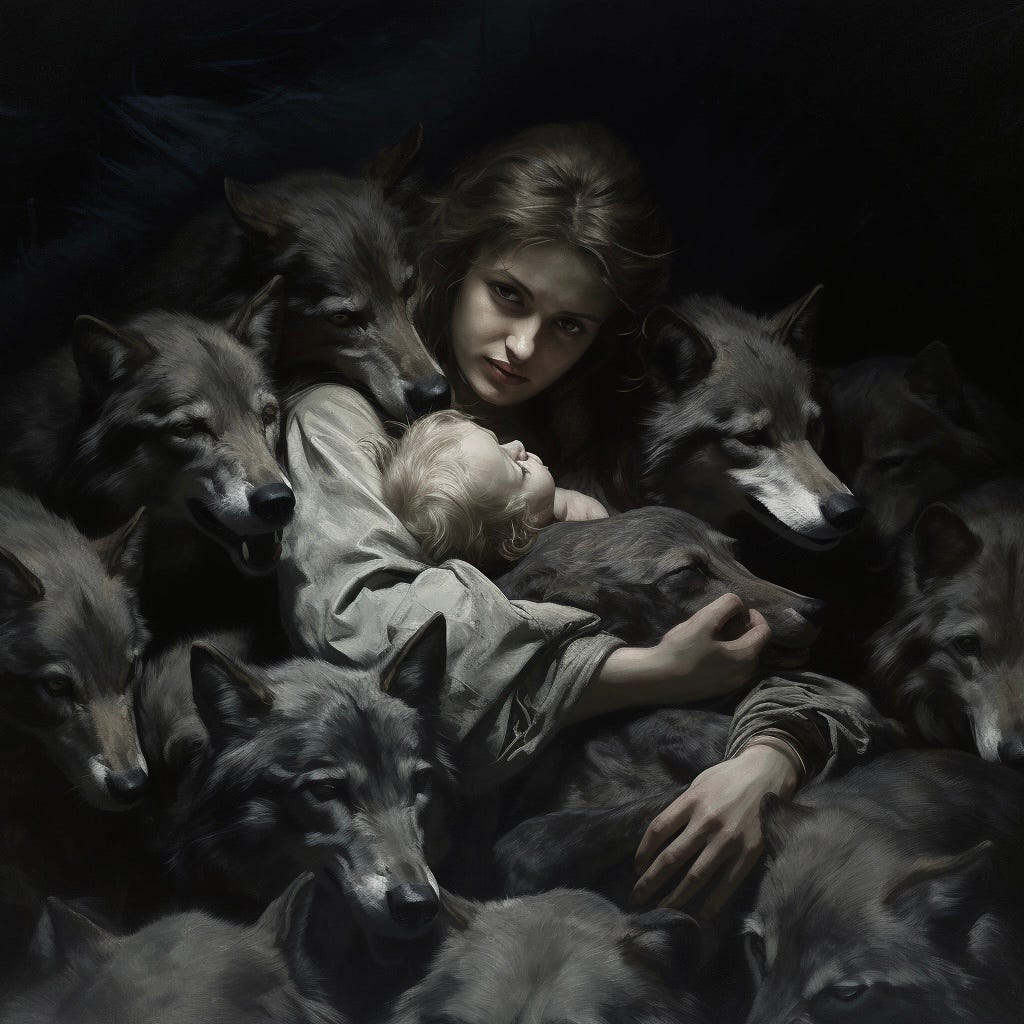


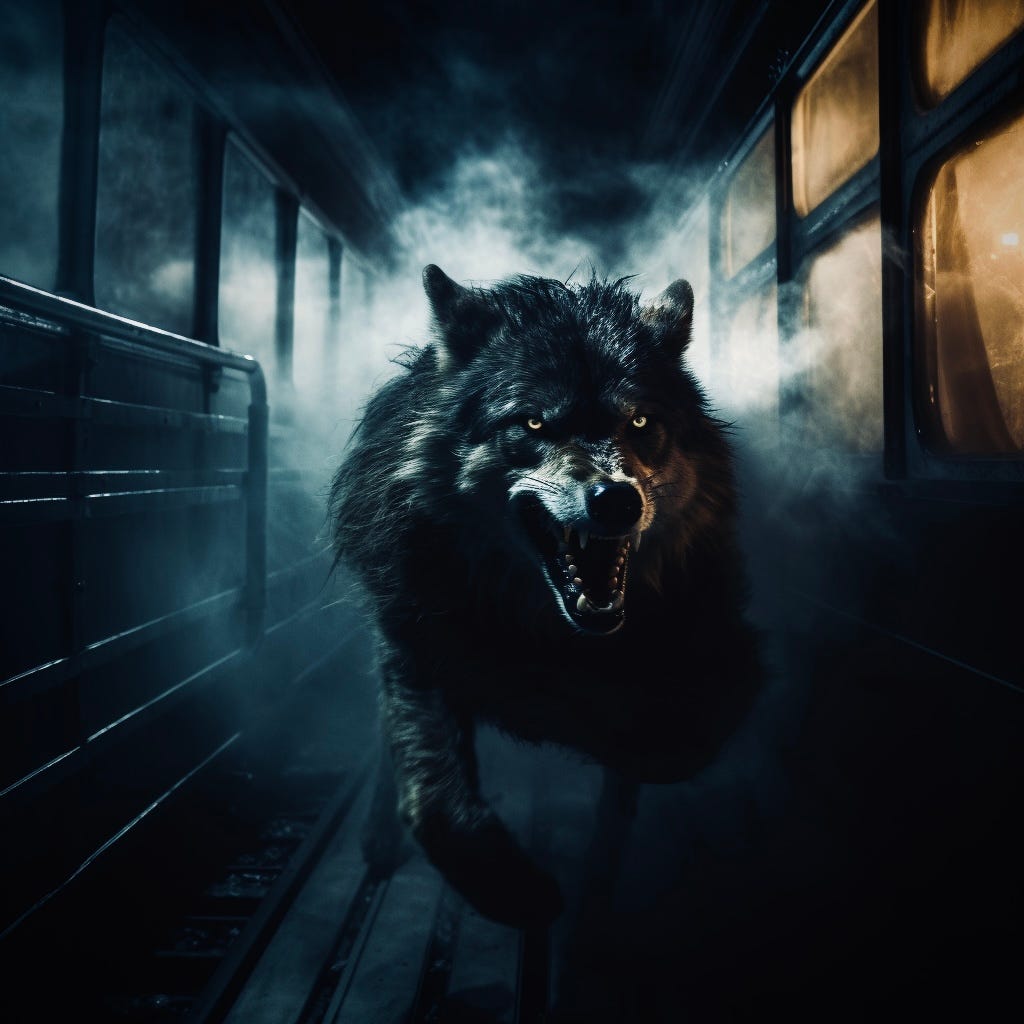



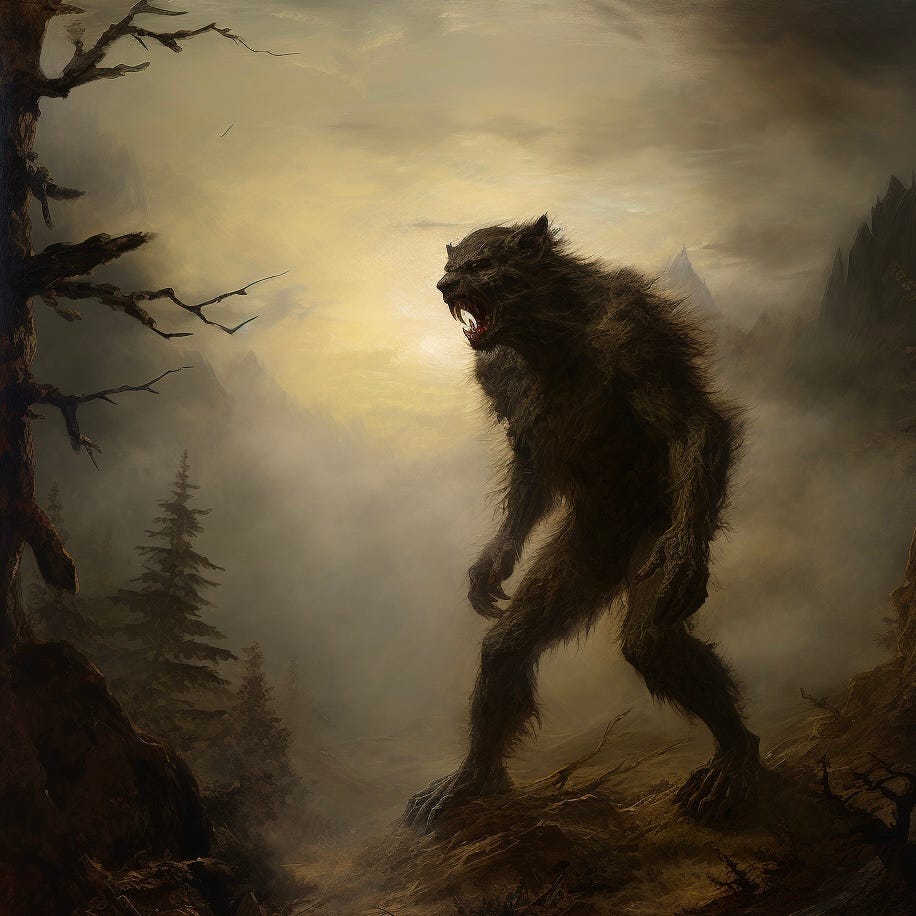



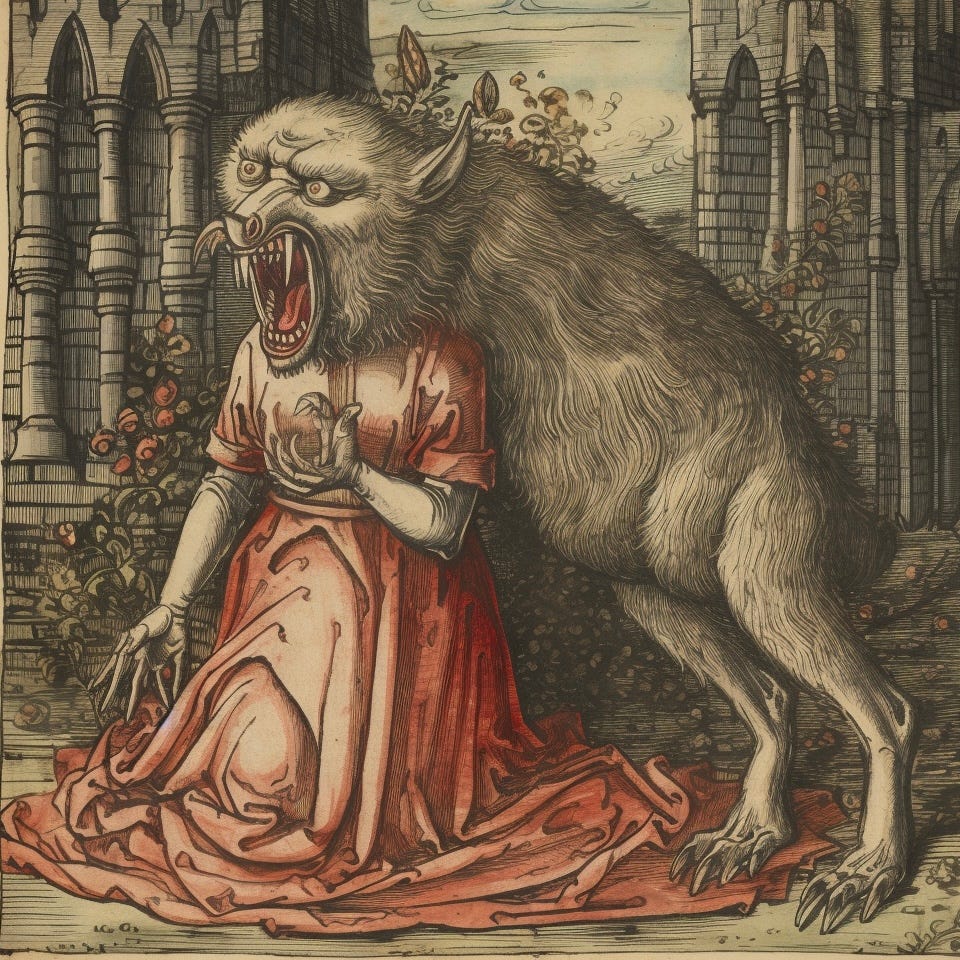


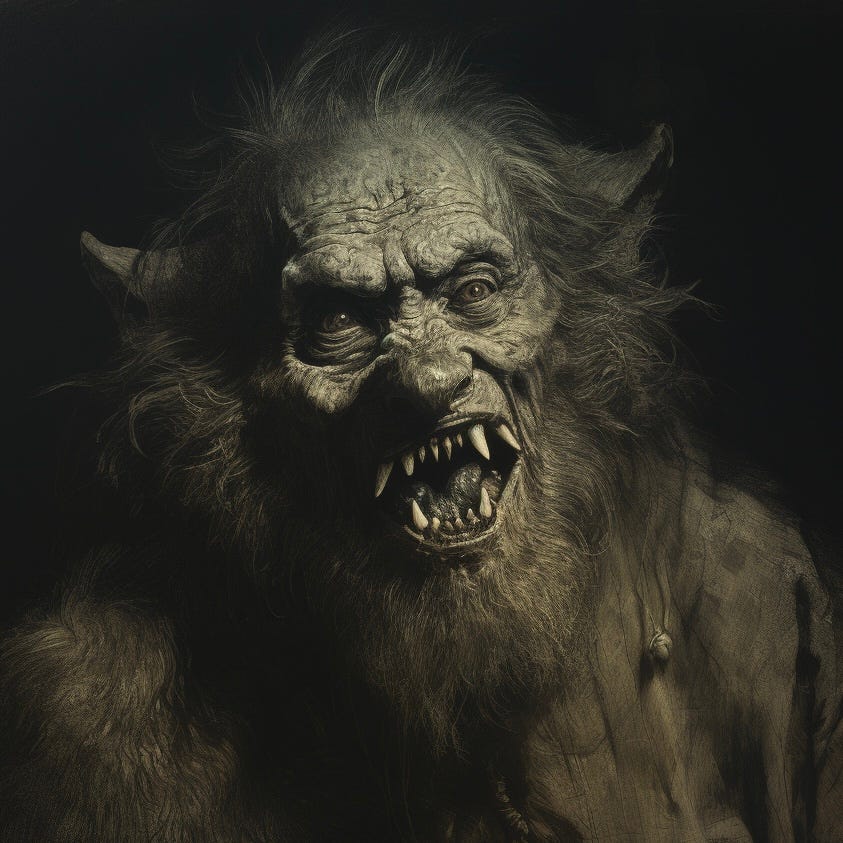
Lecker, Lecker! 😅 that chapter was yummy and rich with supernatural fibers. Weaving in real texts like that, clever!
I'm just riveted by this story.